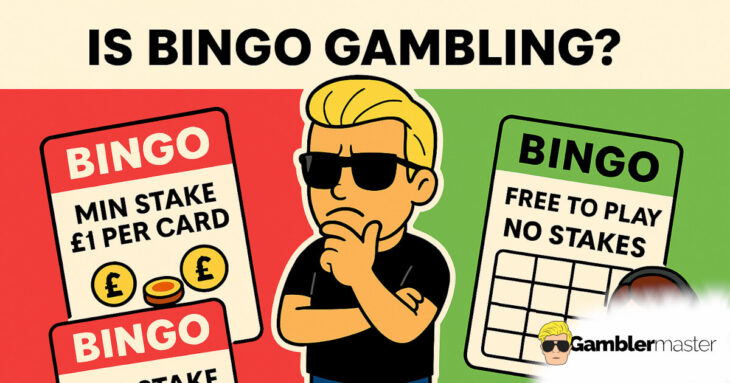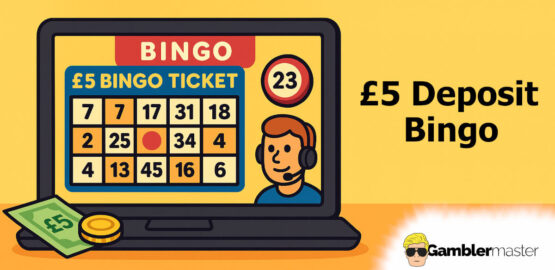Is Bingo Gambling?
By

With bingo transforming from a game played down at pubs and clubs to now being online and part of nightlife and entertainment culture across the UK, many people are wondering whether it’s considered gambling or not. While there are many different views, the UK government’s idea is simple:
If money or something of value is at stake, UK regulators class bingo as gambling. If not, it can be considered as not gambling.
The Gambling Act 2005 contains no statutory definition of bingo but treats it as “equal-chance” gambling when stakes and prizes are involved.
So, whether bingo is considered gambling depends entirely on the context. Commercial cash bingo requires a UK Gambling Commission licence, while charity fundraisers and free-play scenarios often fall outside gambling regulations. The key test remains: wager + chance + prize = gambling.
When Is Bingo Considered Gambling?
Legal framework: The Gambling Act 2005 establishes three core principles that define gambling activities. These are equal chance gaming, participation requirements, and fixed end-points. Bingo typically meets all three criteria when money is involved, placing it firmly within gambling legislation.
Licence requirement: All commercial cash bingo operations, whether online platforms or physical halls, must hold a valid UK Gambling Commission licence. This regulatory requirement provides clear evidence that lawmakers and regulators treat bingo as a gambling activity requiring oversight and consumer protection.
Money-at-stake test: The fundamental gambling equation applies directly to most bingo formats. Players pay money (wager), outcomes depend on random number generation (chance), and winners receive cash or valuable prizes (prize). This three-part test consistently classifies paid bingo as gambling.
Problem gambling risk: Modern bingo is increasingly promoted alongside other betting products on gambling websites. This commercial integration highlights the potential for bingo to trigger gambling-related harm, supporting its classification as a gambling activity requiring responsible gaming measures.
When Is Bingo Not Considered Gambling?
Non-monetary or charity play: When players pay nothing or play solely for donated prizes, bingo steps outside the strict “consideration-risk-prize” model that defines gambling. Many charity bingo nights and fundraising events operate under these conditions, avoiding gambling regulations entirely.
Social and community perception: Traditional bingo halls and community events are widely seen as leisure activities rather than serious gambling. This social perception influences how regulators approach smaller-scale, community-focused bingo operations, particularly those supporting charitable causes.
Skill and participation arguments: Experienced players employ strategies like choosing low-population rooms, managing multiple cards effectively, and implementing disciplined bankroll management. These decision-making elements suggest bingo involves more strategy than pure chance, distinguishing it from simpler gambling formats.
Free-play or bonus ticket scenarios: Online platforms often offer free bingo games using bonus tickets or promotional credits. Since players risk no real money, these scenarios technically fall outside gambling definitions, even though the underlying game mechanics remain identical.
Luck vs Skill: How Does Bingo Actually Work?
Random number generators or traditional blower drums ensure that bingo outcomes are fundamentally chance-based. No player can influence which numbers are called or predict the calling sequence, making luck the primary determining factor in any individual game.
However, player decisions do add strategic elements to bingo play. Choosing games with fewer participants increases winning odds, purchasing multiple cards spreads risk across more number combinations, and setting strict spending limits prevents emotional decision-making during losing streaks.
These strategic considerations mean bingo sits somewhere between pure chance games like slot machines and skill-based activities like poker. While outcomes remain unpredictable, informed players can marginally improve their long-term prospects through smart game selection and bankroll discipline.
Find out more from our guide on how to play bingo.
UK Bingo Laws & Compliance Basics
UK law distinguishes between cash bingo and prize bingo, with different stake and prize limits applying to unlicensed occasions. Section 291 of the Gambling Act 2005 provides specific charity exceptions, allowing fundraising events to operate bingo games without full gambling licences under certain conditions.
The minimum age for all forms of gambling, including bingo, is 18 throughout the UK. Remote gambling operators must also comply with technical standards covering player protection, game fairness, and secure payment processing.
Prize limits for unlicensed bingo events are strictly controlled. Charity fundraisers can offer prizes up to £600 per game, with total prizes not exceeding £900 per event. Exceeding these limits requires proper licensing and regulatory oversight.
Online vs Land-Based Bingo
Both online and land-based bingo operations require proper licensing, but the regulatory approach differs significantly. The trusted online bingo sites use random number generation technology and require a remote gambling licence, while traditional halls operate under premises licences and face regular inspections from local authorities and the UK Gambling Commission.
Online accessibility heightens responsible gambling considerations, as players can access games 24/7 from their homes. This increased availability means online operators must implement stronger player protection measures, including deposit limits, session timers, and self-exclusion tools.
Land-based bingo halls offer more natural social interaction and built-in spending breaks between sessions. However, both formats must provide identical consumer protections under UK gambling law, including age verification, responsible gambling information, and dispute resolution procedures.
![PayPal Bingo Sites UK [year] – Your Complete Guide](https://gamblermaster.co.uk/app/uploads/sites/2/2025/06/paypal-bingo-sites-555x270.jpg)
![Best Bingo Sites with No Wagering in the UK ([year])](https://gamblermaster.co.uk/app/uploads/sites/2/2025/06/no-wagering-bingo-sites-555x270.jpg)
